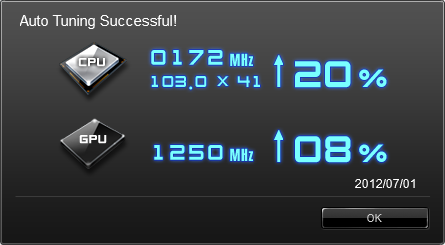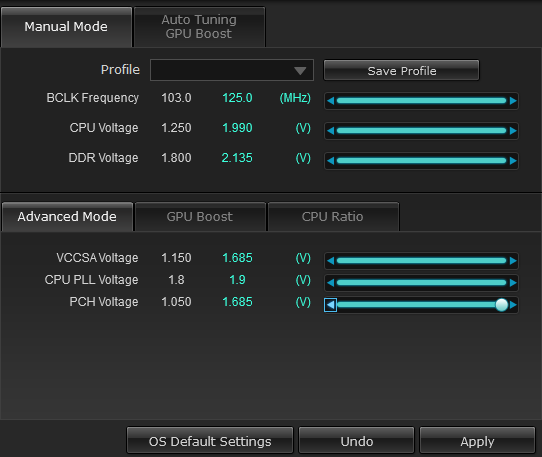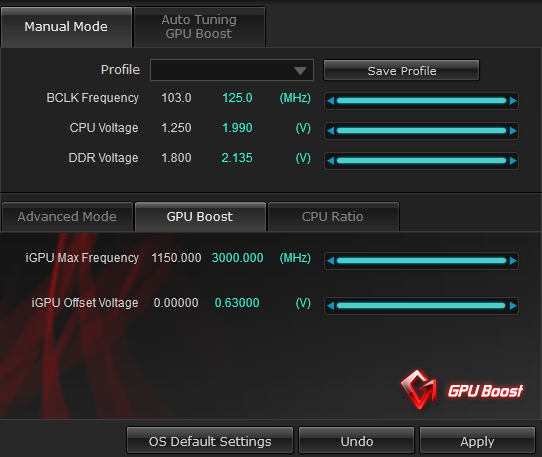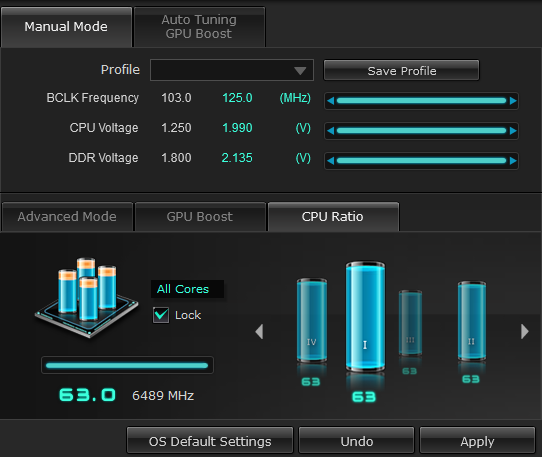Seven Sub-$160 Z77 Express Motherboards, Reviewed
Intel’s LGA 1155 interface is designed for mainstream buyers, yet the firm’s Ivy Bridge-based processors put it in the performance spotlight. We compare seven Z77 Express motherboards that deliver enthusiast-class performance at mainstream prices.
Overclocking With Asus TurboV
In addition to its manual overclocking options, Asus TurboV offers less-knowledgeable users a chance to capitalize on the P8Z77-V LX’s impressive overclocking capabilities through an auto-adjustment utility. The program achieved a stable 4.22 GHz at 1.216 V using its “Fast” overclocking scheme, and 4.84 GHz at 1.456 V after choosing its “Extreme” alternative.
The biggest problem with the Extreme profile is that it applied far too much voltage for our Ivy-Bridge based CPU. These cores are notorious for an interface problem that prevents even the best coolers from achieving useful temperatures at moderate voltage levels, and 1.456 V far exceeds the 1.30 V we feel comfortable recommending as a safe limit for reasonable longevity. With only a little trepidation about potentially frying our CPU, we fired up Prime95 and watched as Intel’s thermal protection mechanism throttled the processor clock within about 20 seconds.
Although TurboV's Auto-Tuning feature is supposed to be easier to use for less experienced overclockers, it's unfortunate that it'd push such an aggressive voltage that isn't even useable without throttling, which inexperienced performance-seekers might not know to check for. Manual tuning became the safer choice for our efforts, then.
Picking settings ourselves, we were able to reach the same overclock using TurboV as we did using Asus' UEFI, and as we've established, some hardcore overclockers find programs like TurboV very useful for altering voltage and clock rates on-the-fly as they toy with extreme cooling methods.
Sliders are shown in their maximum position to indicate TurboV’s limits, though we never approached these in actual operation. “Advanced Mode” adds CSA, PLL, and PCH options to the basic set of voltage controls.
While we don’t believe many users will bother overclocking an Ivy Bridge-based processor’s integrated graphics core, Asus provides both frequency and voltage options in TurboV’s GPU Boost.
A separate menu provides CPU ratio selection in both synchronized and load-based settings. Though the slider is maxed, we never approached its maximum 63x multiplier in our own efforts.
Get Tom's Hardware's best news and in-depth reviews, straight to your inbox.
Current page: Overclocking With Asus TurboV
Prev Page P8Z77-V LX Applications Next Page P8Z77-V LX UEFI-
Crashman SpadeMLAN performance .. ISC performance ... USB 3 .. well that's it then.Tom's Hardware has several controller comparisons, and publishes new ones frequently. So unless you think one of the boards has a broken controller, wysiwyg.Reply
The things that actually get screwed-up are typically related to the clock generator, multiplier control, memory timings and power options. -
jaquith I always appreciate your Articles! :) I know how much work you do to get them done.Reply
You're kidding - Biostar. I guess this article is not about the 'Best Sub-$160 Z77' MOBO's but about the best manufacturers sent you. The cheapest MOBO I recommend for the SB/IB (K) is the ASUS P8Z77-V which pops your 'unique' budget cap depending where you shop; found it here for $159.99 - http://www.gadgetneeds.net/asus-p8z77-v-atx-intel-motherboard/
Interesting you didn't get an ASUS P8Z77-V LK ~$120 which offers SLI. The ASRock Z77 Extreme4 and Gigabyte Z77X-D3H for the price aren't bad.
There's NO WAY I'm recommending Biostar in the forum, folks and myself would thing I've lost my mind. -
Crashman jimishtarIt would be nice to see the CPU voltage for every board when overclocking.1.25VReply -
gorillagarrett No peripherals performance tests? Those are the only tests that differentiate those motherboards from each other.Reply
Would really like to see how the UD3X Atheros Ethernet controller fares against the Intel and broadcom ones. -
Crashman gorillagarrettNo peripherals performance tests? Those are the only tests that differentiate those motherboards from each other. Would really like to see how the UD3X Atheros Ethernet controller fares against the Intel and broadcom ones.I'll let the integrated controller guy know you'd like to see those parts compared :)Reply -
gorillagarrett ReplyI'll let the integrated controller guy know you'd like to see those parts compared
Thank you! -
rolli59 I would have liked to see the Asus P8Z77V-LK version instead of the LX since it is better equipped.Reply




